[See Part I of this essay here]
IV
Augustine’s Hellenistic Hermeneutic
Augustine’s interpretation of the Biblical metanarrative portrays both the creation and the end of the world as the appearance and disappearance of corruptible material existence. He was in no doubt that the New Testament writers were predicting the literal end of the earthly world when, as “[t]he whole Church” expected, Christ would “come down from heaven to judge the living and the dead”.1 Augustine was clear that the Day of Judgement applied not just to the people of Israel but to “the rest of the nations as well”.2 Faithful Christians, those who live according to the spirit, would exchange the perishable goods of mortal existence for the “Supreme Good” of an imperishable “eternal life” in the City of God. Other mortals, those who live according to the flesh, would suffer the “Supreme Evil” of “eternal death,” the nothingness inherent in the absolute privation of the Good.3 It was out of just such nothingness that the world was created on Augustine’s understanding of Genesis One. Furthermore, Augustine’s understanding of Genesis 2-3 identifies Adam, not as proto-Israel, but as the first human being. Accordingly, it not just Old Covenant Israel but mankind as a whole which faces judgement at the end of the world.
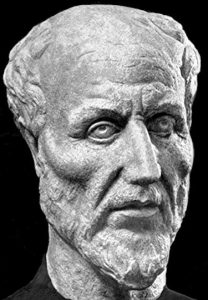
Plotinus (204-270 AD)
Augustine’s neo-Platonic cosmology presupposed the absolute dependence of both mankind and the material world itself on an omnipotent, omniscient, and omnipresent God. Seduced by the delights of our mortal life “[w]e have wandered far from God,” losing sight of “the invisible things of God”.4 The inherent difficulty mortal beings experience in apprehending such invisible divine “objects” must make us eternally thankful for the revealed Word of God. But a proper understanding of sacred scripture depends upon two things, according to Augustine: “the mode of ascertaining the proper meaning, and the mode of making known the meaning when it is ascertained”. Understanding the world generally requires that we distinguish between things and signs. “All instruction is about things or about signs; but things are learned by means of signs”. There are spiritual as well as material things and signs. Higher spiritual things are the true objects of enjoyment and use. A man should view his whole life as “a journey towards the unchangeable life, and his affections [should be] entirely fixed upon that”.5
The Bible is both a material and a spiritual thing which can be used or enjoyed in order to understand and participate in the imperishable City of God. Augustine reminds his readers, however, that not every spiritual or material thing can be judged by its outer form. On the surface, Biblical prophecies of the Day of the Lord may appear to be addressed only to Old Covenant Israel, warning of the impending destruction of Jerusalem. The inner form of such scriptural signs of things to come can sometimes only be understood “by comparing all the similar passages on the subject which occur in the three evangelists Matthew, Mark, and Luke”. Augustine points as well to John “who tells us most clearly that the judgement should take place at the resurrection of the dead”.6 Clearly, Augustine conceives the resurrection of the dead as a material and bodily, not a solely spiritual, phenomenon. No such event has taken place; therefore, he expects the fulfillment of that prophecy to occur at some still future time.
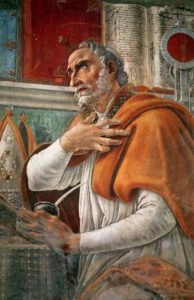
Saint Augustine (354-430 AD)
Augustine knew, of course, that many “wise men of this world” scoffed at any suggestion “that the earthly bodies of men” can “be carried over into a heavenly habitation”. To ward off such scepticism, he drew upon an idea that appeared quite suddenly in the late second century AD to defend the idea of a bodily resurrection. Augustine deployed the doctrine of creation ex nihilo to demonstrate that “He Who in making this world … has already accomplished something far more wondrous than the transformation in which our adversaries refuse to believe”. If God has already bound “incorporeal souls” to earthly bodies, why should we doubt “that bodies, though earthly, should be raised up to abodes which, though heavenly, are nonetheless corporeal”.7
During Augustine’s lifetime, such metaphysical speculation on the origins of matter had already become commonplace among neo-Platonic philosophers such as Plotinus. Augustine followed Plotinus in contending that “creatio ex nihilo was the expression of God’s omnipotent ability to create without need of supporting causes”. Such a doctrine was nowhere to be found in the New Testament.8 Neither the New Testament writers nor Plotinus were responsible for the connection made by Augustine between the creation story and the eschatological hope of a still future resurrection of the body.
Augustine taught “that because every created intelligence had its origin ex nihilo, it also had to look beyond itself for its end. Every creature lacked God’s perfection and was therefore mutable. Because it was mutable it could fall away from that end and become evil”.9 At the same time “the resurrection of our Lord from the dead” added “a great buttress of hope” to our faith. Our bodies, too, after the death we suffer because of sin “shall at the resurrection be changed into a better form … this corruptible shall put on incorruption, and this mortal shall put on immortality”. He urged the faithful to believe “that neither the human soul nor the human body suffers complete extinction but that the wicked rise again to endure inconceivable punishment, and the good to receive eternal life”.10
V
Augustine’s Hellenistic Hermeneutic as Practical Theology
One may well doubt whether Augustine’s interpretive techniques offered a true understanding of the Biblical metanarrative, especially when compared to a Hebraic hermeneutic solidly grounded in the lived apostolic experience of the church in the first century AD. On the other hand, one might defend Augustine’s biblical metanarrative on the ground that it was demonstrably useful to the church in the increasingly chaotic circumstances of the late Roman Empire in the West. Augustine offered much more than abstract metaphysical speculation. The hermeneutical rules and techniques he outlined in On Christian Doctrine were clearly conceived as an aid to practical theology:
“It is the duty, then, of the interpreter and teacher of Holy Scripture, the defender of the true faith and the opponent of error, both to teach what is right and to refute what is wrong, and in the performance of this task, to conciliate the hostile, to rouse the careless, and to tell the ignorant both what is occurring at present and what is probable in the future.”11
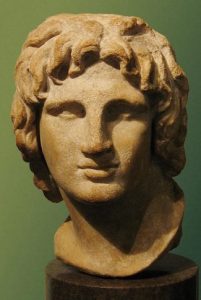
Alexander The Great
The practical tasks of the early church were set largely by the perceived need to help individuals cope with the anomic conditions of the Hellenistic world. Alexander’s conquests resulted in extensive social amalgamation and ethnic admixture throughout the Greece and the Near East, destabilizing Hellenic culture and traditional Greek religion. Greeks and other peoples lost their national religions. Alexander’s cosmopolitan policies caused citizens “who formerly derived a sense of unity, stability, and even immortality from their common ancestral religion … to feel alone, alienated, and threatened”. The decline of traditional social institutions led individuals “to focus more upon their own personal existence and seek membership in nonbiologically related universal cults that provide opportunities for socialization and a promise of individual salvation”. The early Christian emphasis idea of salvation “referred primarily to the bodily resurrection of the individual,” an eschatological hope bound to have a certain appeal to deracinated Hellenic man.12 Everything that “weakened the particularism of cities” encouraged the spread of the universalistic idea of “humanity” and world-rejecting religions that extended their benefits to all mankind.13
Augustine insisted that a proper interpretation of the Bible must “tend to build up [the] twofold love of God and our neighbour”.14 As a practical matter, Augustine’s reading of the Bible creates a curious paradox: the very process of creating a new Christian society in accordance with Augustine’s prescription, dissolves “the human race … into its many individuals”. According to Hannah Arendt, the Christian believer relates in love to his neighbour “only insofar as divine grace can be at work in him. I never love my neighbour for his own sake, only for the sake of divine grace …We are commanded to love our neighbour, to practice mutual love, only because in so doing we love Christ”.15 Or, as Augustine put it:
“Whoever, then, loves his neighbour aright, ought to urge upon him that he too should love God with his whole heart, and soul, and mind. For in this way, loving his neighbour as himself, a man turns the whole current of his love both for himself and his neighbour into the channel of the love of God, which suffers no stream to be drawn off from itself by whose diversion its own volume should be diminished.”16
Every individual was isolated in his relationship to God; he is also a member of the human race. So, too, is our neighbour. As a consequence, the “mere common existence of believers grounded in the selfsame God becomes the common faith and community of believers”.17 Paradoxically, it is the very isolation of the individual before God, that allows the collective body of Christian believers to detach itself from human history and project itself forward, beyond the end times, into the heavenly City of God. In the pre-Constantinian era, the church successfully created a Christian ethnos (or natio in the Latin West).18 Eusebius of Caesarea (c. AD 260-339), the first great church historian, identified Jesus Christ as the founder “of a people not heard of since time began that now is not hidden in some corner of the earth but is found everywhere under the sun”. Equipped “with weapons of faith” the souls of that people “proved stronger than adamant in struggles with their enemies”.19 The fact that Augustine and many of the early church fathers made universalizing claims does not negate this proposition.

Hanna Arendt (1906-1975)
On the contrary, according to Denise Kimber Buell, “saying that Christianity is open to all people is not mutually exclusive with defining Christians as members of an ethnoracial group”. In the ancient world race or ethnicity “was often deemed to be produced and indicated by religious practices”. It was all too easy, therefore, for early Christians to use forms of “ethnic reasoning to legitimize various forms of Christianness as the universal, most authentic manifestation of humanity”.20 Eusebius, for example, famously proclaimed the triumph of Constantine as the foreordained fusion of universal empire with a universal church. And, indeed, Byzantine Caesaropapism did manage to preserve the synthetic unity of church and state for over a thousand years in the Eastern half of the Roman Empire.
But, barely a century later, pagans bitterly blamed the church for the sack of Rome by barbarian hordes. Augustine was compelled to recognize that Latin Christian identity could no longer be anchored safely in perishable earthly kingdoms. Amidst the accelerating collapse of the Roman Empire in the West, Augustine’s universalistic vision of the eternal City of God provided the embryonic Roman Catholic church with a powerful raison d’être. In a material world mired in sin, corruption, and decay, the church became the visible earthly conduit to the heavenly realm. In our own day, however, it no longer seems possible to tie Christian identity to the eschatological destiny of the entire human race.
VI
Augustinian Hermeneutics in the Post-Christian West
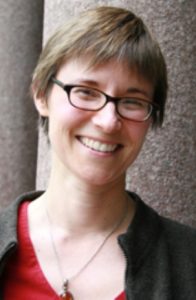
Denise Kimber Buell
So long as the intellectual horizons of late antiquity were bounded by the limits of the Greco-Roman oikumene, Augustine’s literal or allegorical equation of the biblical metanarrative with the history of the whole human race was at least plausible. On “the faith of Holy Scripture, which not unworthily has marvellous authority throughout the whole world and among all nations,” Augustine maintained that “from one man, whom God created as the first, the whole human race took its origin”. Christian writers computed “from the sacred writings that six thousand years have not yet passed since the creation of man”. To support such claims, Augustine was compelled to reject as “wholly untruthful” Greek and Egyptian “writings which purport to contain the history of many thousands of years of time”.21 To the extent that it rested upon such self-serving assertions, however useful Augustine’s Biblical hermeneutic may have been to the early church, its truth claims remain highly suspect. The question for those us living in what is widely acknowledged to be a “post-Christian” world is simply: does an Augustinian understanding of the Bible remain at all useful, even for Christians if not for the church?
Nowadays, few people, not even many Christians, regard the first few chapters of the Book of Genesis as a reliable guide to the origins of mankind. Indeed, as a practical matter, the very idea of “humanity” is itself little more than an abstract concept. More than two centuries ago, the reactionary Catholic monarchist, Joseph de Maistre, issued the following response to the French constitution of 1795 which “like its [revolutionary] predecessors has been drawn up for Man”:
“Now, there is no such thing in the world as Man. In the course of my life, I have seen Frenchmen, Italians, Russians, etc.; I am even aware, thanks to Montesquieu, that one can be a Persian. But, as for Man, I declare I have never met him in my life. If he exists, I certainly have no knowledge of him.”22
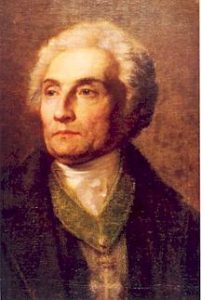
Joseph de Maistre (1753-1821)
De Maistre rejected the idea of “humanity”; he remained nonetheless an orthodox defender of Catholic ecclesiastical Tradition. For him, biblical hermeneutics, the task of revealing the true understanding of Holy Scripture, was a matter best left to the church, not to the laity. Despite his disbelief in the religion of humanity, de Maistre did not deny that Augustine’s tale of two cities had been, and perhaps still could be, useful as a matter of practical theology. After all, Christendom arose at a time when the peoples of the Mediterranean basin could imagine themselves to be the entire “human race”. Accustomed to ideas of imperial citizenship, they were open to the idea that all the nations of the oikumene shared a common “humanity,” at least on the spiritual level. Certainly, the Augustinian Tradition did much to transform the warring tribes of Western Europe into a family of Christian nations.
Since Augustine’s lifetime, as the boundaries of the “human race” expanded to incorporate a great many previously unknown “sub-races” and ethnic groups differing radically in intelligence, behaviour, and temperament, the idea of Man has become little more than a philosophical abstraction bereft of any necessary or organic connection to Christian identity. Indeed, European-descended Christians steeped in the Augustinian Tradition now comprise but a shrinking minority of “the human race”. Strangely, however, it is these people who cling to the most “adamant” and unyielding faith in the idea of Man. It seems not to matter whether a humanist hermeneutic is true, or even useful in helping us understand the Word of God. A faith that was once merely orthodox has become increasingly radical in its stance towards the truths contained in Holy Scripture and their usefulness to the church in a post-Christian society.
VII
Conclusion
Unfortunately, contemporary Radical Orthodoxy (RO) gives more weight to the Augustinian inventions of creation ex nihilo and futurist eschatology than to the Hebraic hermeneutic and cosmology of those who wrote and edited the Bible. RO grounds its own theological hermeneutic firmly in Tradition. RO theologians such as John Milbank and like-minded political philosophers such as Jean Bethke Elshtain share the Augustinian presupposition that all nations and peoples share a common ancestor and, therefore, have all been made in the image of God. Despite our common origin, however, Elshtain resists the “bland assertion that we are all alike”. Following Augustine, she declares that the further apart we are, the greater the need to shore up our faith in our shared humanity.23
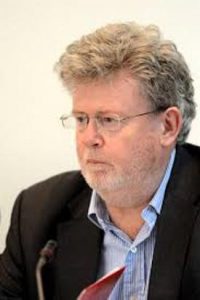
Alasdair John Milbank
Elshtain is convinced that “the importance of plurality, of the many emerging from a unique one, cannot be underestimated in Augustine’s work”. For her, as for Milbank, human unity hidden within diversity is an ontological not merely historical condition, one which obtains whether one speaks of ancient Israel, the western Mediterranean in Augustine’s lifetime, or the modern post-Christian West. From this trans-historical perspective, Elshtain argues that “From one creates a fragile but real ontology of peace, or relative peacefulness”. From the beginning, human beings were tied by bonds of affection. Over time, they became further bound by ties of kinship and affection. The more fragile and attenuated those ties become, however, the more important the ontology of peace is to human beings. As relationships of kinship and affection “are dispersed, finally encompassing the whole globe, and in light of the confusion and confounding of human languages, the more difficult it is to repair to this fundamental kinship or sociality in order to strike a blow for peace and against war”. Augustine provided us with “a perfect vision of peace” in the Heavenly City. But, she adds, “there is earthly work to be done in the name of peace”. This ontological primacy of peace over war holds true wherever Man is to be found, in Old Covenant Israel, the Mediterranean world of late antiquity, or modern America.24
Like Elshtain, Milbank privileges ontology over history in the realm of politics and ecclesiology.25 He reads the biblical metanarrative as the story of a struggle between the “ontology of violence” and the “ontology of peace”. His version of Augustine’s Hellenistic hermeneutic presupposes that “the absolute uniqueness of every individual … makes difference ontologically ultimate and worthy of the highest valuation”. Out of this world of difference the commandment to love thy neighbour brings forth the highest form of unity in love of God. Augustinian Christianity “denies ontological necessity to sovereign rule and absolute ownership,” both of which rest upon coercion and violence.26
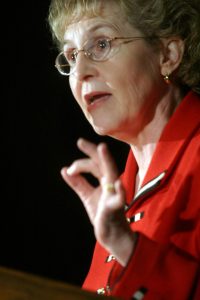
Jean Bethke Elshtain (1941-2013)
RO, therefore, “seeks to recover the concealed text of an original peaceful creation beneath the palimpsest of the negative distortion of dominium”. Milbank declares that the “Church, in order to be the Church, must seek to extend the sphere of socially aesthetic harmony”. The tradition of Christian charity seeks “something like the ‘peaceful transmission of difference’, or ‘differences in continuous harmony’. Moreover, Milbank believes that “Christianity from the start considered that it could be adequately repeated in very diverse cultural settings, involving very different sets of cultural roles”. Like Augustine, Milbank and Elshtain agree that it is only the outer form of the biblical metanarrative that has to do with the history of the ancient Israel of God. Milbank flatly rejects what he calls the “antique ethics of the city”. In place of the civic virtues once nurtured within the ancient polis, he sets “the ethics of the ecclesia” which “is able to accord only a qualified value to particular historical formations”.27 The “concealed text” of the bible story from Genesis to Revelation, serves as the template for “the progressive, visible realization in time of the universal community”.28
Milbank’s Augustinian hermeneutic thus presupposes a still-future eschaton which channels the ontology of peace into the course of human history. This presupposition helps Milbank neatly avoid the questions begged by the “metaphors of coercive action by God in the Book of Revelation”. Could that story of Christ’s eschatological action be taken literally to refer to the first-century destruction of Jerusalem? Can God himself be held responsible for such a catastrophic holocaust? Perhaps the original Hebraic hermeneutic of Holy Scripture offers every nation and people in the post-Christian West an understanding of the Biblical metanarrative that is both true and useful. Anglo-Saxon Protestants, in particular, might turn to the Bible in somewhat the manner of their Angelcynn ancestors in the time of Alfred the Great.29 That is to say, the Anglo-Saxon peoples around the globe should still look to the bible stories about the rise and fall of Old Covenant Israel not just for a great store of spiritual wisdom, but also as a divine warrant for the creation of their own holy Christian nation. Finally, the end of the Biblical narrative at the bloody fall of Jerusalem sends a clear warning of the terrible divine judgement awaiting the British peoples should we, too, fall under the spell of Satanism. Who knows? Perhaps the modern English nation can emulate ancient Israel by incubating and then, miraculously, giving birth to our very own Patriot King.30 Lord knows, we stand sorely in need of such a saviour!
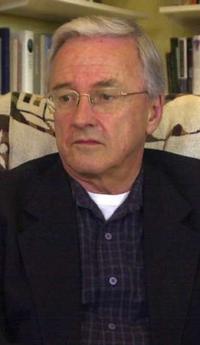 Andrew Fraser was born, raised, and educated in Canada and the United States of America. He taught constitutional law and legal history for many years at Macquarie University, Sydney Australia and is the author of The WASP Question, an inquiry into Anglo-Saxon identity in the context of the modern, globalising world. His Dissident Dispatches is based on his recent experience earning a Bachelor of Theology degree from Charles Sturt University.
Andrew Fraser was born, raised, and educated in Canada and the United States of America. He taught constitutional law and legal history for many years at Macquarie University, Sydney Australia and is the author of The WASP Question, an inquiry into Anglo-Saxon identity in the context of the modern, globalising world. His Dissident Dispatches is based on his recent experience earning a Bachelor of Theology degree from Charles Sturt University.
Endnotes:
- Augustine, The City of God Against the Pagans, R.W.Dyson (ed. & trans.) (Cambridge: Cambridge University Press, 1998), Bk. XX, ch. 1, p. 965.
- Ibid., Bk. XX, ch. 5, p. 973.
- Ibid., Bk. XIX, ch. 3, p. 918.
- Augustine, Christian Doctrine (Radford, VA: Wilder Publications, 2013) p. 14.
- Ibid., pp. 12-13, 22.
- Augustine, City of God, op. cit. Bk. XX, ch. 5, pp. 973-974.
- Ibid., Bk. XXII, ch. 4, pp. 1111-1112.
- Hubler, James Noel Hubler, “Creation ex Nihilo: Matter, Creation, and the Body in Classical and Christian Philosophy Through Aquinas” Scholarly Commons (University of Pennsylvania, 1995) pp. 143, 107.
- Ibid., p. 143.
- Augustine, Christian Doctrine, op. cit. pp. 20-22.
- Ibid., p. 112.
- James C. Russell, The Germanization of Early Medieval Christianity: A Sociohistorical Approach to Religious Transformation (New York: Oxford University Press, 1994), pp. 63-67, 73.
- Ibid., p. 70.
- Augustine, Christian Doctrine, op. cit. p. 32.
- Hannah Arendt, Love and Saint Augustine (Chicago: University of Chicago Press, 1996 [1929]), p. 111.
- Augustine, Christian Doctrine, op. cit. p. 23.
- Arendt, Love and Saint Augustine, op. cit. p. 112.
- Buell, Why This New Race: Ethnic Reasoning in Early Christianity (New York: Columbia University Press, 2005) p. 41.
- Eusebius of Caesarea, The Church History Paul L. Maier (trans. & commentary) (Grand Rapids, MI: Kregel, 2007), p. 313.
- Buell, Why This New Race, op. cit. pp. 61, 2-3.
- Augustine, City of God, op. cit. Bk. XII, chapters 9 & 10, pp. 511-512.
- Joseph de Maistre, Considerations on France (Cambridge: Cambridge University Press, 1995 [1797]), p. 53.
- Jean Bethke Elshtain, Augustine and the Limits of Politics (Notre Dame, IN: University of Notre Dame Press, 2018), p. 103.
- Ibid., pp. 102-105.
- See, the critique of Milbank by Todd Breyfogle, “Is There Room for Political Philosophy in Postmodern Critical Augustinianism,” in Wayne J. Hankey & Douglas Hedley (eds.) Deconstructing Radical Orthodoxy: Postmodern Theology, Rhetoric, and Truth (Aldershot: Ashgate, 2005), p. 53.
- John Milbank, Theology and Social Theory: Beyond Secular Reason Second Edition (Oxford: Blackwell, 2006), p. 423.
- Ibid., pp. 422-423.
- Breyfogle, “Postmodern Critical Augustinianism” op. cit. p. 54.
- Sara Foot, “The Making of Angelcynn” Transactions of the Royal Historical Society 6 (1996) pp. 25-49; See also, Judith McClure, “Bede’s Old Testament Kings,” in Patrick Wormald, al.,(eds) Ideal and Reality in Frankish and Anglo-Saxon Society (Oxford: Basil Blackwell, 1983).
- See, Henry St. John, Viscount Bolingbroke (1678-1751), “The Idea of a Patriot King,” in David Armitage (ed.) Bolingbroke: Political Writings (Cambridge: Cambridge University Press, 1997). For my own take on the contemporary significance of Bolingbroke’s “Idea of a Patriot King,” see my “Monarchs and Miracles: Australia’s Need for a Patriot King” The Occidental Quarterly Vol 5 Issue 1 (Spring 2005).
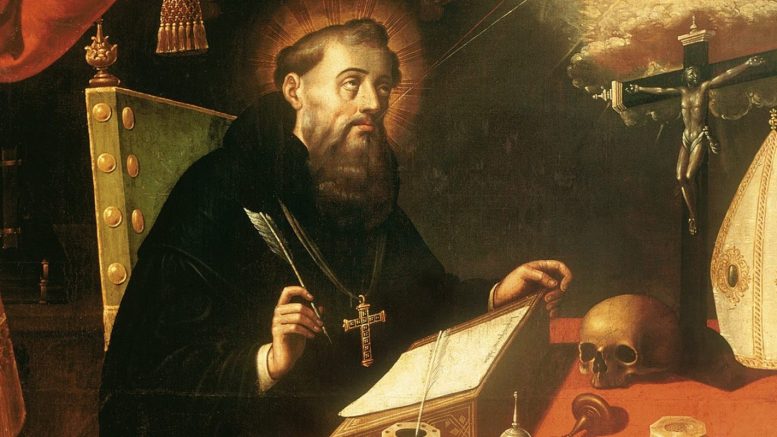

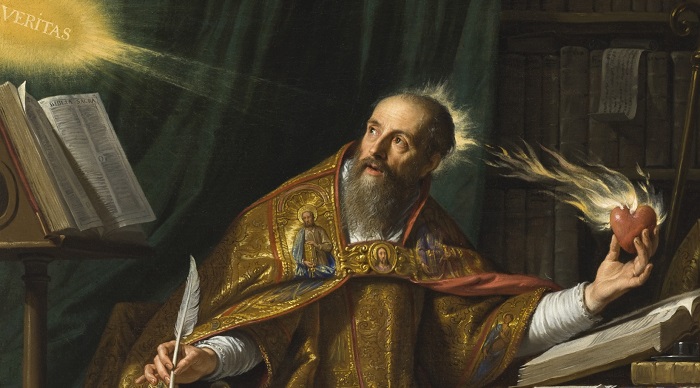
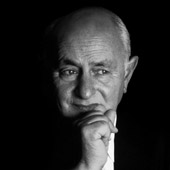
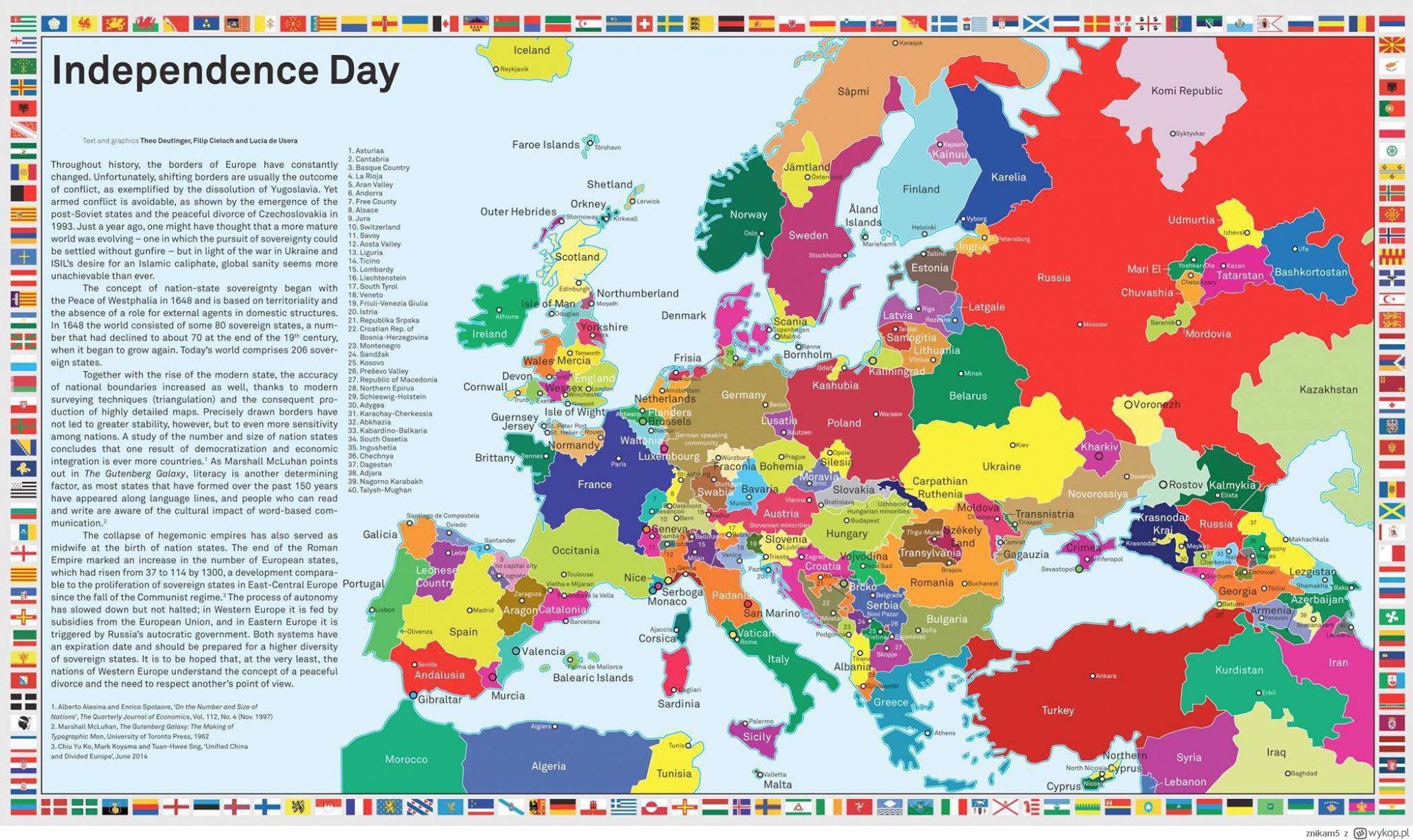
this is very interesting its given me a lot to think about